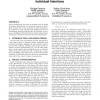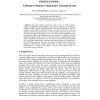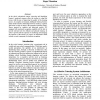12 search results - page 1 / 3 » Cognitive Social Learners: An Architecture for Modeling Norm... |
ATAL
2006
Springer
14 years 1 months ago
2006
Springer
Social commitments have been increasingly used to model inter-agent dependencies and normative aspects of multiagent systems such as the semantics of agent communication. However,...
EXPERT
2007
13 years 9 months ago
2007
Agent-based social simulation (with multi-agent systems), which is an important aspect of social computing, can benefit from incorporating cognitive architectures, as they provid...
ITS
1992
Springer
14 years 1 months ago
1992
Springer
Abstract. This paper reports our research work in the new field of humancomputer collaborative learning (HCCL). The general architecture of an HCCL is defined. An HCCL system, call...
FLAIRS
2006
13 years 10 months ago
2006
1 In the classic educational context, observing and identifying learner's emotional response allow the teacher to adapt the lesson, with the aim of improving the quality of th...
CMOT
2006
13 years 9 months ago
2006
This contribution investigates the function of emotion in relation to norms, both in natural and artificial societies. We illustrate that unintentional behavior can be normative an...



